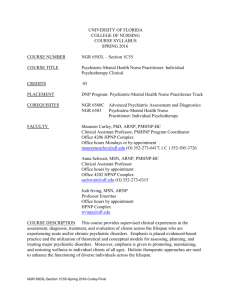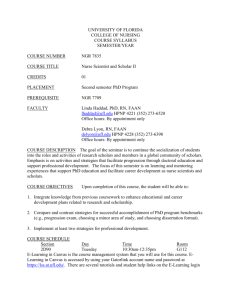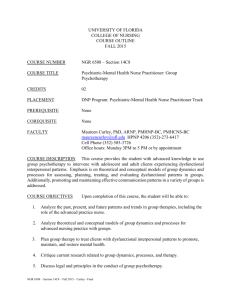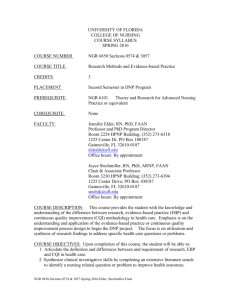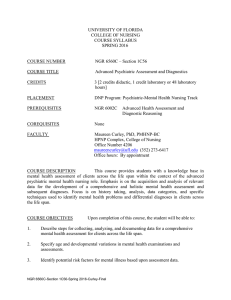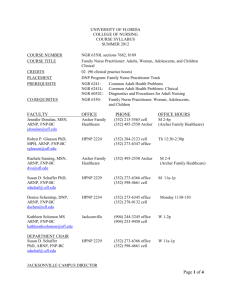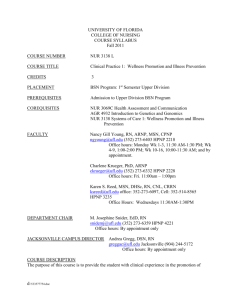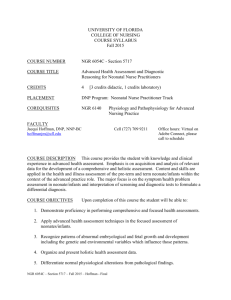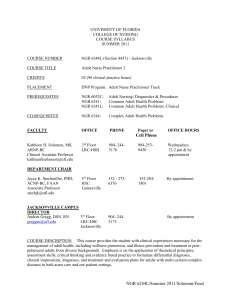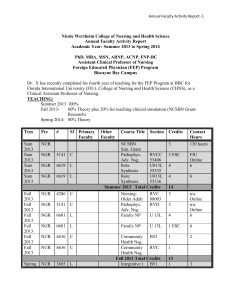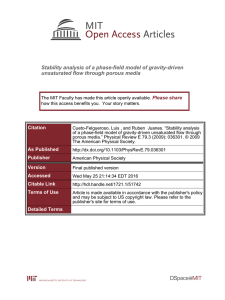PREREQUISITE NGR 6509L Psychiatric
advertisement
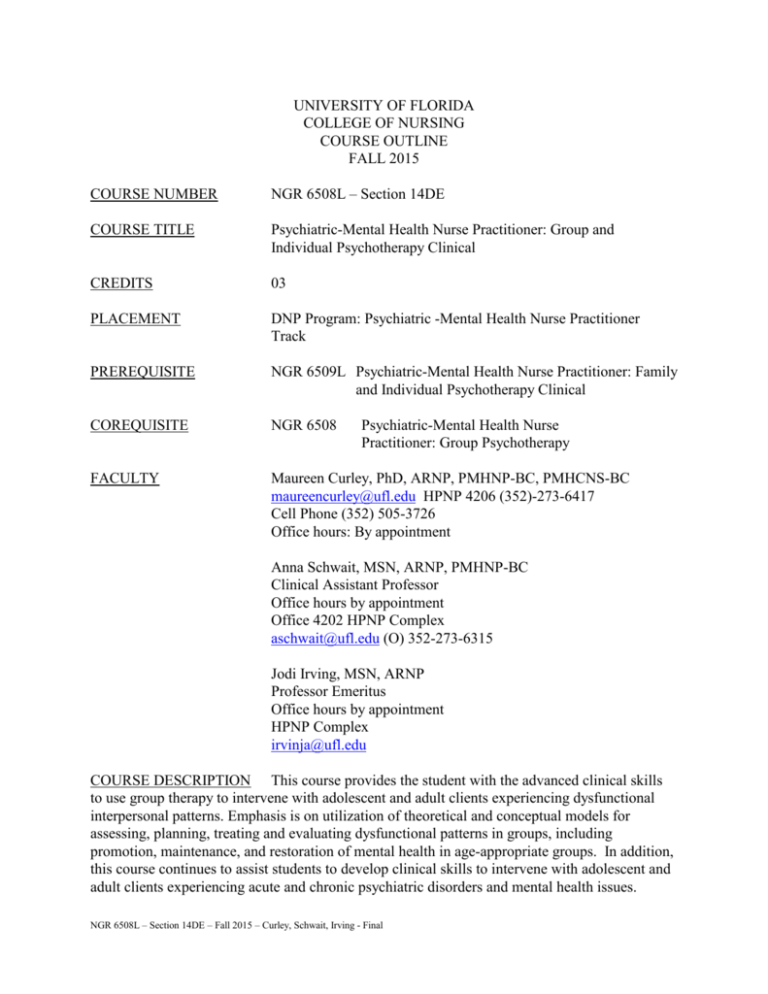
UNIVERSITY OF FLORIDA COLLEGE OF NURSING COURSE OUTLINE FALL 2015 COURSE NUMBER NGR 6508L – Section 14DE COURSE TITLE Psychiatric-Mental Health Nurse Practitioner: Group and Individual Psychotherapy Clinical CREDITS 03 PLACEMENT DNP Program: Psychiatric -Mental Health Nurse Practitioner Track PREREQUISITE NGR 6509L Psychiatric-Mental Health Nurse Practitioner: Family and Individual Psychotherapy Clinical COREQUISITE NGR 6508 FACULTY Maureen Curley, PhD, ARNP, PMHNP-BC, PMHCNS-BC maureencurley@ufl.edu HPNP 4206 (352)-273-6417 Cell Phone (352) 505-3726 Office hours: By appointment Psychiatric-Mental Health Nurse Practitioner: Group Psychotherapy Anna Schwait, MSN, ARNP, PMHNP-BC Clinical Assistant Professor Office hours by appointment Office 4202 HPNP Complex aschwait@ufl.edu (O) 352-273-6315 Jodi Irving, MSN, ARNP Professor Emeritus Office hours by appointment HPNP Complex irvinja@ufl.edu COURSE DESCRIPTION This course provides the student with the advanced clinical skills to use group therapy to intervene with adolescent and adult clients experiencing dysfunctional interpersonal patterns. Emphasis is on utilization of theoretical and conceptual models for assessing, planning, treating and evaluating dysfunctional patterns in groups, including promotion, maintenance, and restoration of mental health in age-appropriate groups. In addition, this course continues to assist students to develop clinical skills to intervene with adolescent and adult clients experiencing acute and chronic psychiatric disorders and mental health issues. NGR 6508L – Section 14DE – Fall 2015 – Curley, Schwait, Irving - Final COURSE OBJECTIVES Upon completion of this course, the student will be able to: 1. Integrate the role of the advanced practice nurse into clinical practice with groups and individuals. 2. Utilize theoretical and conceptual models as a basis for advanced nursing practice with individuals and groups. 3. Implement group therapy to treat dysfunctional interpersonal patterns and to promote, maintain, and restore mental health with selected clients using age-appropriate methods. 4. Evaluate the effectiveness of group and individual therapy based on client outcomes. 5. Utilize current research in group psychotherapy with adolescents and adults to identify researchable problems in group work. 6. Use self-awareness of emotional and behavioral responses to others to enhance the group process. 7. Apply principles of leadership in collaboration with other health care providers to conduct group psychotherapy. CLINICAL SCHEDULE E-Learning in Sakai is the course management system that you will use for this course. ELearning in Sakai is accessed by using your Gatorlink account name and password at http://lss.at.ufl.edu. There are several tutorials and student help links on the E-Learning login site. If you have technical questions call the UF Computer Help Desk at 352-392-HELP or send email to helpdesk@ufl.edu. It is important that you regularly check your Gatorlink account email for College and University wide information and the course E-Learning site for announcements and notifications. Course websites are generally made available on the Friday before the first day of classes. Section 14DE Day Time Room To be arranged with preceptor and faculty member. CLINICAL GROUP SUPERVISION SCHEDULE Section Day Time 14DE Monday 12NOON -130PM Room ONLINE CANVAS TEACHING METHODS Seminar, supervised clinical practice, individual and group supervision, written assignments, audiovisual materials, and selected readings. NGR 6508L – Section 14DE – Fall 2015 – Curley, Schwait, Irving - Final LEARNING ACTIVITES Clinical practice, written assignments, readings, and clinical reports. CLINICAL EVALUATION Minimum Required Clinical Practice Hours: 144 hours Clinical experience will be evaluated through faculty observation, verbal communication with the student, written work, and agency staff reports using a College of Nursing Clinical Evaluation Form. Faculty reserve the right to alter clinical experiences, including removal from client care areas, of any student to maintain patient safety and to provide instructional experiences to support student learning. Evaluation will be based on achievement of course and program objectives using a College of Nursing Clinical Evaluation Form. All areas are to be rated. A rating of Satisfactory represents satisfactory performance and a rating of Unsatisfactory represents unsatisfactory performance. The student must achieve a rating of Satisfactory in each area by completion of the semester in order to achieve a passing grade for the course. A rating of less than satisfactory in any of the areas at semester end will constitute an Unsatisfactory course grade. The faculty member will hold evaluation conferences with the student and clinical preceptor at each site visit. The faculty member will document or summarize each conference on the Clinical Evaluation Form or Incidental Advisement Record. This summary will be signed by the faculty member and students. Mid-rotation evaluation of conferences will be made available to each student. Final evaluation conferences with the faculty member are mandatory and will be held during the last week of each clinical rotation. A student may request additional conferences at any time by contacting the clinical faculty member. Students enrolled in advanced practice courses with a clinical component will use Clinical Experience Form F to document clinical experience including hours, practice location and preceptor for their personal records. Students also assess their learning experience using Clinical Site Assessment Form G. Completed Form G is collected by the faculty member and submitted to the Coordinator of Clinical Laboratories at the College. At the end of the clinical experience the student completes a self-evaluation and the faculty completes a student evaluation using the College of Nursing Clinical Evaluation Form. MAKE UP POLICY Students will notify faculty in advance for any anticipated absences, missed assignments due to excused absences, or missed clinical hours. Students will develop arrangements with the faculty or and clinical preceptor as required to make up missed written or clinical assignments, as well as clinical hours. NGR 6508L – Section 14DE – Fall 2015 – Curley, Schwait, Irving - Final GRADING SCALE/QUALITY POINTS Clinical component: S Satisfactory = Meets course objectives U Unsatisfactory = Does not meet course objectives For more information on grades and grading policies, please refer to University’s grading policies: http://gradcatalog.ufl.edu/content.php?catoid=4&navoid=907#grades UNIVERSITY AND COLLEGE OF NURSING POLICIES: Please see the College of Nursing website for a full explanation of each of the following policies - http://nursing.ufl.edu/students/student-policies-and-handbooks/course-policies/. Attendance Academic Honesty UF Grading Policy Accommodations due to Disability Religious Holidays Counseling and Mental Health Services Student Handbook Faculty Evaluations Student Use of Social Media REQUIRED TEXTBOOK Yalom, I. D. (2006).The theory and practice of group psychotherapy (5th ed.). New York: Basic Books. RECOMMENDED TEXTBOOKS Corey, M., Corey, G., & Corey, C. (2013). Groups: Process and practice (9th ed.). California: Brooks Cole. Approved: Academic Affairs Committee: Faculty: UF Curriculum: NGR 6508L – Section 14DE – Fall 2015 – Curley, Schwait, Irving - Final 01/08; 01/13 02/08; 01/13 10/08; 03/13
